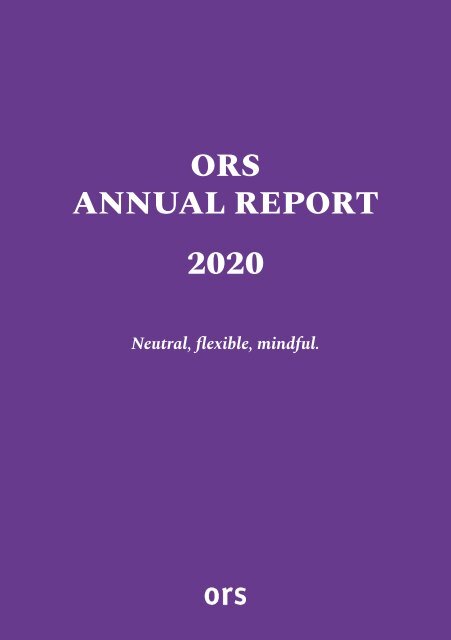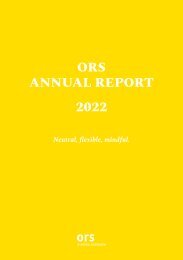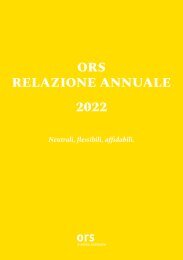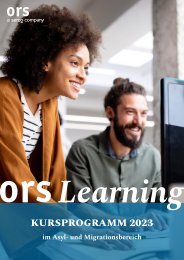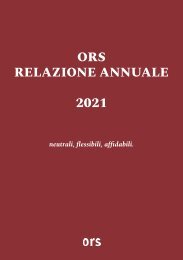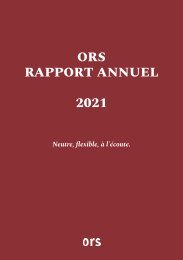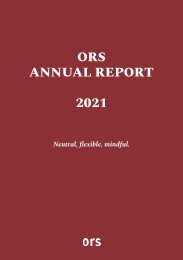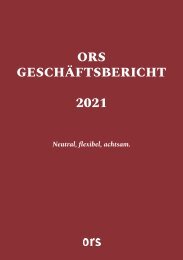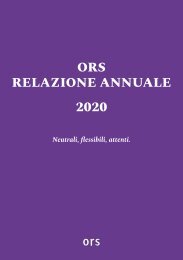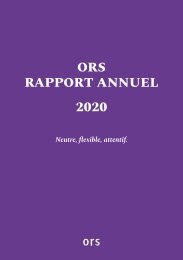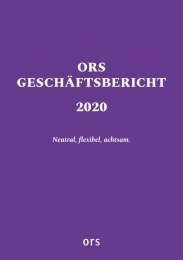ORS Annual Report 2020 English
ORS Annual Report 2020 in English
ORS Annual Report 2020 in English
Create successful ePaper yourself
Turn your PDF publications into a flip-book with our unique Google optimized e-Paper software.
<strong>ORS</strong><br />
ANNUAL REPORT<br />
<strong>2020</strong><br />
Neutral, flexible, mindful.<br />
1
CONTENTS<br />
<strong>ORS</strong> believes in the importance of equal opportunity. We use gender-neutral language<br />
in this <strong>Annual</strong> <strong>Report</strong> to refer equally to female, male and non-binary individuals.<br />
Editorial: <strong>ORS</strong>’s journey through the year of coronavirus<br />
<strong>ORS</strong> Group facts & figures<br />
<strong>2020</strong> milestones – <strong>ORS</strong> Switzerland<br />
Laura Mastronardi – day-to-day life in a repatriation centre<br />
Sophia Egli – a start in life for unaccompanied minor asylum seekers<br />
<strong>2020</strong> milestones – <strong>ORS</strong> Germany<br />
Claudia Hänig – coronavirus scare in refugee accommodation<br />
Claudia Gawlowski – committed to vulnerable refugees<br />
<strong>2020</strong> milestones – <strong>ORS</strong> Austria<br />
Nina Trippl – support work is teamwork<br />
<strong>2020</strong> milestones – <strong>ORS</strong> Italy<br />
Sabrina Montagna – a rock in stormy situations<br />
HR & training<br />
Karolina Trappitsch – personnel management as an opportunity for development<br />
<strong>Annual</strong> results <strong>2020</strong><br />
<strong>ORS</strong> Advisory Board – interview with Rita Fuhrer<br />
Group management and management values<br />
Our values<br />
Glossary<br />
Our locations<br />
4<br />
6<br />
8<br />
12<br />
14<br />
16<br />
20<br />
22<br />
24<br />
28<br />
30<br />
34<br />
36<br />
38<br />
40<br />
44<br />
46<br />
48<br />
50<br />
54<br />
2 3
‘I believe in flexible working<br />
conditions that allow women<br />
better access to managerial<br />
positions and enable them<br />
to bring greater perspective<br />
and diversity to our<br />
decision-making<br />
processes in these key<br />
roles.’<br />
Dear Readers,<br />
I am delighted to have been asked to introduce the <strong>2020</strong> <strong>Annual</strong> <strong>Report</strong>. This year, it focuses<br />
on women, mothers, management roles and, above all, the female members of the <strong>ORS</strong><br />
team. Gender equality and respect are the cornerstones of our diverse organisation, and<br />
we expect an equal balance of power between men and women at all levels and in all roles.<br />
More women in managerial positions<br />
Being the only woman on the Group management team, as I am at present, is not always<br />
easy. While it does not tend to take us long to reach a consensus where goals and commitment<br />
are concerned, we women often have a different approach to achieving those goals.<br />
The discussions surrounding this and the different perspectives are what makes our work<br />
so interesting – we tend to weigh up more options and consider more diverse possibilities<br />
in our teams where there is a balanced mix of men and women. We are more productive<br />
when we work together.<br />
Our goal is for half of all managerial positions to be filled by women by 2025. We are still<br />
some way off. In <strong>2020</strong>, women made up around 37% of <strong>ORS</strong> Group employees and 42% of<br />
managers were female.<br />
<strong>ORS</strong>’s journey through the year of coronavirus<br />
In common with everyone, regardless of organisation or circumstances, our experience<br />
of <strong>2020</strong> was very much dominated by coronavirus. Our colleagues went above and beyond<br />
when it came to implementing all the required measures and contingencies. I am proud to<br />
see that, one year on, everyone is still very much on the ball and committed to providing the<br />
best support, day after day, for those living in our accommodation facilities.<br />
Despite explanatory videos and other multilingual information materials for the residents,<br />
an active crisis team and extensive hygiene and protection measures, we were unable to<br />
keep COVID-19 out of our facilities. May <strong>2020</strong> proved particularly challenging when a mass<br />
outbreak took hold in the Sankt Augustin central refugee facility (ZUE) in Germany, which<br />
required the mobilisation of assistance from all areas of the Group. Thankfully, we managed<br />
to get the situation under control and learned valuable lessons from the experience.<br />
<strong>2020</strong> also proved very eventful in other areas aside from coronavirus. In Switzerland, we<br />
started work on our major mandates in the canton of Bern. These involve providing support<br />
for refugees, from accommodation to integration in the job market, and running repatriation<br />
centres. In Italy, we were able to stabilise our mandates on Sardinia – something<br />
we certainly had not taken for granted given the difficult security situation. In Germany,<br />
we began work in a new district in Baden-Württemberg with the opening of two reception<br />
facilities in Karlsruhe. In contrast, we have to report a significant downturn in Austria. Following<br />
the decision to nationalise responsibilities for refugees, we handed over our services<br />
to the state-run agency at the end of November and, after nine years, had to discontinue<br />
over 90% of our activities.<br />
Our <strong>Annual</strong> <strong>Report</strong> – this year in the capable hands of women<br />
In this year’s <strong>Annual</strong> <strong>Report</strong>, you can learn about our mindset and methods from a woman’s<br />
perspective and gain insight into a world in which we work day in, day out to provide the<br />
individuals in our care with the best quality support and integration.<br />
Carolin Wälz-Fabregon<br />
Managing Director, <strong>ORS</strong> Deutschland GmbH<br />
Member of the Group management team<br />
Mother of two<br />
4 5
FACTS & FIGURES<br />
As at 31 December <strong>2020</strong><br />
4+2 countries<br />
CH<br />
DE<br />
AT<br />
IT<br />
ES<br />
GR<br />
Zurich<br />
Freiburg<br />
Vienna<br />
Rome<br />
Madrid<br />
Athens<br />
70+<br />
Support facilities<br />
mandates<br />
Bed capacity<br />
10,000+<br />
CH<br />
DE<br />
AT<br />
IT<br />
6,500+<br />
4,000+<br />
100+<br />
200+<br />
CH<br />
DE<br />
AT<br />
IT<br />
60+<br />
10<br />
2<br />
3<br />
Number of employees<br />
1,309<br />
CH<br />
DE<br />
AT<br />
IT<br />
815<br />
439<br />
7<br />
48<br />
Women in managerial positions<br />
42%<br />
CH<br />
DE<br />
IT<br />
21%<br />
49%<br />
AT 71%<br />
25%<br />
6 7
MILESTONES<br />
<strong>2020</strong><br />
06/<strong>2020</strong><br />
Switzerland<br />
03/<strong>2020</strong><br />
Opening of cantonal<br />
accommodation for vulnerable<br />
individuals in Embrach<br />
(ZH): capacity 50 people<br />
04/<strong>2020</strong><br />
Opening of the Erlenhof Zurich care<br />
centre as a cantonal emergency hospital<br />
for rejected asylum seekers in quarantine:<br />
capacity 36 people<br />
Reopening of the Les<br />
Passereaux centre in Broc (FR):<br />
capacity 60 people<br />
New service agreements with<br />
local authorities come into force<br />
Opening of Boltigen federal asylum<br />
centre (BAZ) (BE):<br />
capacity 120 people<br />
Opening of the temporary ‘Fridau’<br />
transit centre in Egerkingen (SO)<br />
for resettlement refugees:<br />
capacity 40 people<br />
05/<strong>2020</strong><br />
Suspension of the job<br />
market integration<br />
programme at training<br />
restaurants Engel<br />
in Pratteln (BL) and<br />
Cittadella (TG) in German-speaking<br />
Switzerland as a result<br />
of coronavirus<br />
Reopening of<br />
Muttenz BAZ (BL):<br />
capacity 250 people<br />
08/<strong>2020</strong><br />
Opening of the Fribourg<br />
cantonal police canteen,<br />
‘Le Vidocq’, with<br />
apprenticeships for<br />
five asylum seekers<br />
10/<strong>2020</strong><br />
Expansion of integration services in the<br />
mandate for the canton of Fribourg with<br />
a 100% female team of nine integration<br />
advisers<br />
All accommodation placed under<br />
quarantine: Möhlin (AG), Dübendorf<br />
(ZH)<br />
11/<strong>2020</strong><br />
Opening of Brugg BAZ (AG):<br />
capacity 220 people<br />
<strong>ORS</strong> approved as SPI-<br />
TEX-SPITIN organisation:<br />
ors@home<br />
JANUARY<br />
FEBRUARY<br />
MARCH APRIL MAY JUNE JULY AUGUST SEPTEMBER OCTOBER NOVEMBER DECEMBER<br />
8 9
MILESTONES<br />
<strong>2020</strong><br />
Switzerland<br />
<strong>ORS</strong> Switzerland – impacts of the pandemic<br />
on asylum support<br />
<strong>ORS</strong> felt the effects of the COVID-19<br />
pandemic in Switzerland. Because<br />
borders outside Europe were closed,<br />
there was little migration, which in<br />
turn meant that asylum accommodation<br />
was at low capacity. The low<br />
numbers did, however, offer a better<br />
opportunity to implement measures<br />
designed to prevent the spread<br />
of coronavirus. We worked with our<br />
partners to develop, adapt and implement<br />
pandemic plans. We also had to<br />
set up new, temporary facilities for<br />
vulnerable groups and for individuals<br />
who were self-isolating or subject<br />
to quarantine requirements. <strong>ORS</strong><br />
Switzerland is grateful that the collaboration<br />
with partners at national,<br />
cantonal and local level functions so<br />
well. At the same time, <strong>ORS</strong> Switzerland<br />
is proud of its employees. They<br />
have done sterling work in support,<br />
medical care and integration without<br />
being distracted by public pressure<br />
stirred up by third parties.<br />
New mandates<br />
The fact that we were able to take<br />
on two mandates in the canton of<br />
Bern (repatriation centres and the<br />
NaBe mandate to restructure asylum<br />
and refugee support in the Oberaargau-Emmental<br />
region) underlines the<br />
growing importance of the range of<br />
services we offer the public sector. At<br />
times, we had to summon up resources<br />
at very short notice so that temporary<br />
centres could be opened as part<br />
of the fight against COVID-19. <strong>ORS</strong><br />
was able to demonstrate its flexibility<br />
and reliability here and hire over 240<br />
new employees.<br />
New service agreements<br />
<strong>ORS</strong> was able to offer a standardised<br />
and modular service agreement to the<br />
30 or so local authorities that work<br />
with us in the field of asylum and<br />
refugee coordination. Following restructuring,<br />
<strong>ORS</strong> Switzerland has divested<br />
itself of loss-making mandates<br />
and positioned itself as an attractive<br />
service provider in public tender procedures.<br />
In spring <strong>2020</strong>, coronavirus<br />
meant that we had to suspend operations<br />
at the ‘Engel’ restaurant in Pratteln<br />
and the ‘Cittadella’ restaurant in<br />
Frauenfeld, along with the associated<br />
integration programme that trains<br />
asylum seekers to work in the catering<br />
industry. However, we were able<br />
to initiate a refugee project as part<br />
of our mandate for the canton of Fribourg,<br />
taking over the management<br />
of ‘Le Vidocq’, the cantonal police<br />
canteen.<br />
Employees step up<br />
Our employees were not untouched<br />
by coronavirus. Luckily, however,<br />
we only saw a few sporadic positive<br />
Le Vidocq (the Fribourg cantonal<br />
police canteen) has been run by<br />
<strong>ORS</strong> since August <strong>2020</strong>. Young<br />
refugees undergo culinary training<br />
here and can be integrated into the<br />
job market.<br />
cases. Wherever possible, our staff<br />
switched to working from home.<br />
The experience showed that flexible<br />
working can lead to greater personal<br />
responsibility and can have a positive<br />
impact on the completion of assignments.<br />
<strong>ORS</strong> persevered despite the<br />
waves of coronavirus and, with almost<br />
30 years’ experience under our<br />
belt, we showed that our support,<br />
accommodation and integration services<br />
can be relied on whatever the<br />
circumstances.<br />
10 11
Laura Mastronardi<br />
Director Adliswil repatriation<br />
centre (RKZ)<br />
Joined <strong>ORS</strong> CH in 2015<br />
‘As a manager, I bring my experience<br />
to the table and work<br />
with my team to try and make<br />
the residents’ time with us as<br />
pleasant as possible.’<br />
A container settlement in Adliswil,<br />
around 10 kilometres outside Zurich,<br />
is temporary home to individuals<br />
whose asylum application has been<br />
officially rejected. The people who<br />
live here – men, women and families<br />
with children, a maximum of 140 in<br />
total – have been instructed to leave<br />
Switzerland. Laura Mastronardi is<br />
responsible for managing the centre<br />
where, despite the asylum seekers’<br />
shattered hopes, the focus is on treating<br />
people with humanity.<br />
The year <strong>2020</strong> was certainly challenging.<br />
The conclusion that Laura was<br />
able to draw from dealing with the<br />
pandemic and the associated protective<br />
measures is that optimism,<br />
flexibility and creativity go a long<br />
way towards overcoming a problem.<br />
Good team spirit, support within the<br />
centres and good communication<br />
between centre directors are equally<br />
important in her working environment.<br />
Laura feels that this is a key<br />
benefit of working for <strong>ORS</strong>. She sees<br />
the fact that she was appointed to run<br />
the centre in <strong>2020</strong> as a sign of trust of<br />
the other repatriation centres in the<br />
Zurich cantonal mandate and longterm<br />
colleagues from other support<br />
facilities in Switzerland. She hopes to<br />
be a good role model and to be able to<br />
make fair, comprehensible and transparent<br />
decisions.<br />
‘Good experiences<br />
make us stronger. But<br />
overcoming tricky<br />
situations that take us<br />
out of our comfort zone<br />
can also have a positive<br />
impact on us.’<br />
To unwind and recharge her batteries,<br />
she likes to spend time in the<br />
great outdoors and is a keen sportswoman.<br />
Her personal philosophy is<br />
one of idyllic coexistence between all<br />
individuals.<br />
‘It is only when we<br />
recognise that there are<br />
fewer differences<br />
between us than our<br />
ego would like to<br />
believe that we begin to<br />
treat our fellow human<br />
beings as equals.’<br />
12 13
Sophia Egli<br />
Social worker, specialising in<br />
support for unaccompanied minors<br />
in the canton of Solothurn<br />
Joined <strong>ORS</strong> CH in 2016<br />
‘Offering young refugees prospects<br />
and showing them how<br />
they can make the transition to<br />
independent living is my biggest<br />
motivation.’<br />
Sophia Egli’s goal is to help young<br />
people with a migration background<br />
to tackle the challenges of independent<br />
living. Based in the canton of<br />
Solothurn, the social worker and her<br />
five-strong team support unaccompanied<br />
minor asylum seekers (UMAs)<br />
who have fled to Switzerland without<br />
their parents. They provide financial<br />
support, serve as legally appointed<br />
custodians on behalf of the Child and<br />
Adult Protection Authority (KESB)<br />
and support the youngsters during<br />
their time in assisted UMA accommodation<br />
or with foster families.<br />
Each youngster brings with them<br />
their own personal set of experiences<br />
and resources.<br />
‘As far as I’m concerned,<br />
there are no<br />
hopeless cases. Everyone<br />
deserves a chance.’<br />
The job of UMA coaching is to uncover<br />
the youngster’s personal situation,<br />
work with them on their<br />
prospects and support them on their<br />
individual journey. If they are to live<br />
independently in Switzerland, it is<br />
important to help them to find their<br />
feet. Structures are needed to provide<br />
clarity and security while offering<br />
learning arenas for individual development<br />
at the same time.<br />
UMA coaching has been run on these<br />
principles since 2016. Over 160 UMAs<br />
have since been helped to develop<br />
their abilities over short or longer<br />
periods. In <strong>2020</strong>, almost 50 UMAs<br />
reached such a high level of independence<br />
in all aspects of life that we<br />
were able to discharge them from the<br />
coaching programme. Many go on to<br />
settle in Switzerland and complete an<br />
apprenticeship. Car mechanic, joiner<br />
and logistics specialist are among<br />
the most popular careers. Where the<br />
youngsters have undergone extremely<br />
traumatic experiences or have had<br />
little education, the integration process<br />
often takes longer. Flexibility<br />
and creativity are sometimes needed.<br />
‘We just keep at it! Step by step. For<br />
some the steps are bigger, for others<br />
small,’ explains Egli, who has been<br />
working at <strong>ORS</strong> for five years.<br />
She constantly documents her conversations<br />
with the youngsters, noting<br />
down key words and making<br />
sketches. Thoughts, fears, goals and<br />
possible solutions gradually materialise.<br />
Once problems and questions<br />
are out in the open, they can be examined,<br />
discussed and worked through<br />
with the youngsters.<br />
‘We share the youngsters’<br />
joy in their personal<br />
successes.’<br />
Her notes help her to leave her<br />
thoughts behind in the office at the<br />
end of the day.<br />
14 15
MILESTONES<br />
<strong>2020</strong><br />
Germany<br />
05/<strong>2020</strong><br />
Opening of the temporary accommodation at Bad<br />
Honnef ZUE (NRW) as a result of coronavirus:<br />
day-to-day support, hospital ward:<br />
capacity 193 people<br />
Opening of Durlacher Allee regional reception<br />
facility (LEA), Karlsruhe (BW) with accommodation<br />
and day-to-day support:<br />
500 spaces regular accommodation + 400 spaces<br />
short-term stays<br />
03/<strong>2020</strong><br />
Closure of<br />
‘Weiche’ integration restaurant<br />
in Freiburg as a result of<br />
of coronavirus<br />
Mass COVID-19 outbreak at<br />
Sankt Augustin ZUE (NRW)<br />
04/<strong>2020</strong><br />
Opening of Eggenstein<br />
reception facility (EA)<br />
(BW) with accommodation<br />
and day-to-day<br />
support:<br />
capacity 500 people<br />
09/<strong>2020</strong><br />
Tübingen EA (BW)<br />
Hospital ward<br />
12/<strong>2020</strong><br />
Sigmaringen LEA (BW): Separation<br />
accommodation with dayto-day<br />
support:<br />
design occupancy 875<br />
Closure of Colditzstrasse Berlin<br />
hostel (GU)<br />
11/<strong>2020</strong><br />
Closure of the temporary<br />
Bad Honnef ZUE (NRW)<br />
JANUARY<br />
FEBRUARY<br />
MARCH APRIL MAY JUNE JULY AUGUST SEPTEMBER OCTOBER NOVEMBER DECEMBER<br />
16<br />
17
MILESTONES<br />
<strong>2020</strong><br />
Germany<br />
<strong>ORS</strong> Germany – coronavirus and other<br />
developments<br />
Spring <strong>2020</strong> – support under<br />
COVID-19 conditions<br />
The outbreak of the coronavirus pandemic<br />
in March <strong>2020</strong> turned support<br />
on its head. Within next to no time,<br />
the teams at <strong>ORS</strong> Germany had to<br />
adjust to providing support under<br />
the strictest hygiene and safety measures.<br />
Activities for residents, particularly<br />
children, were temporarily<br />
suspended, cohorts were formed and<br />
one of the few highlights of the day,<br />
the shared mealtimes, had to be abandoned,<br />
with residents eating in their<br />
rooms instead.<br />
The biggest challenge for the organisation<br />
came at the Sankt Augustin<br />
ZUE, where over 200 residents and 23<br />
team members were infected. Thanks<br />
to support from staff from other facilities<br />
and from Switzerland and<br />
Austria, we were given the all-clear a<br />
few weeks later. The <strong>ORS</strong> integration<br />
restaurant ‘Die WEICHE Freiburg’<br />
was a victim of the economic impact<br />
of the coronavirus and has not reopened.<br />
New accommodation <strong>2020</strong><br />
In spring <strong>2020</strong>, <strong>ORS</strong> Germany was<br />
awarded the contract for the Durlacher<br />
Allee LEA in Karlsruhe and<br />
the Eggenstein-Leopoldshafen reception<br />
facility (EA). Since May, <strong>ORS</strong> has<br />
been actively supporting up to 1,000<br />
refugees on behalf of the administrative<br />
authority in Karlsruhe. Shortly<br />
afterwards, we opened the Bad-Honnef<br />
ZUE in North Rhine-Westphalia,<br />
a temporary facility designed to open<br />
for a fixed term of six months to provide<br />
care for up to 200 vulnerable<br />
individuals during the coronavirus<br />
pandemic. Since September, the <strong>ORS</strong><br />
mandate at the Tübingen EA has been<br />
extended to include the operation of a<br />
hospital ward.<br />
And finally, at the end of the year,<br />
separate accommodation was added<br />
at the Sigmaringen LEA to serve as<br />
a distribution and quarantine centre,<br />
staffed by an additional team.<br />
Efficiency boost for all<br />
teams at headquarters<br />
While we are pleased to report growth<br />
in Germany, <strong>ORS</strong> is now at its capacity<br />
limits in organisational terms.<br />
New approaches are required, including<br />
digitalisation. The introduction<br />
of a digital application management<br />
system, a central procurement and<br />
contract management system and<br />
programmes to simplify time management<br />
and shift planning are key<br />
steps when it comes to efficiency.<br />
Additional contracts and closures<br />
In addition to the Bad Honnef<br />
ZUE, we said goodbye to the team<br />
in Berlin at the end of the year.<br />
The support mandate in the capital<br />
has been transferred to one of<br />
our competitors. However, <strong>ORS</strong><br />
has been awarded the contract for<br />
three new accommodation facilities<br />
with even greater responsibility: the<br />
Düren ZUE in North Rhine-Westphalia<br />
from 1 March 2021 plus Hermeskeil<br />
and Kusel reception centres<br />
for asylum seekers (AfA) in Rhineland-Palatinate<br />
from 1 April 2021.<br />
18 19
Claudia Hänig<br />
Operations manager<br />
Sankt Augustin ZUE<br />
Joined <strong>ORS</strong> DE in 2019<br />
‘With enough self-belief, the<br />
question of whether you’re going<br />
to succeed becomes less about<br />
impossible challenges and more<br />
of about self-fulfilling prophecies.’<br />
In a refugee centre, many of the residents<br />
and staff come from countries<br />
with a highly patriarchal tradition.<br />
This means that you have to work<br />
doubly hard to assert yourself as a<br />
woman in management. Claudia faces<br />
this challenge on a daily basis as<br />
operations manager at the Sankt Augustin<br />
ZUE in North Rhine-Westphalia.<br />
When the facility experienced<br />
a coronavirus outbreak in spring <strong>2020</strong><br />
and the virus brought the lives of the<br />
400 or so residents to a halt, Claudia<br />
proved her worth as a walking symbol<br />
of the new society in which the refugees<br />
find themselves.<br />
An issue that affected everyone in<br />
<strong>2020</strong>, but particularly those at the<br />
Sankt Augustin ZUE, was COV-<br />
ID-19. Following a mass outbreak<br />
and full quarantining of a large section<br />
of the regular staff, the resolute<br />
core of remaining employees, supported<br />
by <strong>ORS</strong> staff from other locations<br />
and with external assistance<br />
from the emergency services, had to<br />
pull together and weather this difficult<br />
time. ‘In a situation like that,<br />
it is vital to be able to rely on one<br />
another and support each other,’ the<br />
operations manager explains. Claudia<br />
is convinced that the ability to<br />
master mammoth tasks such as this<br />
is not gender specific. She believes<br />
that the way we deal with situations<br />
like this has much more to do<br />
with our experience and character.<br />
‘With enough self-belief, the question<br />
of whether you’re going to succeed<br />
becomes less about impossible challenges<br />
and more about self-fulfilling<br />
prophecies.’ You need to have a<br />
thick skin in some situations, which<br />
is why it is important to maintain a<br />
good work-life balance and have a<br />
strong network of friends and family<br />
for support.<br />
‘Successful outcomes<br />
and being part of the<br />
positive development<br />
of a resident’s fate<br />
through your team’s<br />
efforts hold much more<br />
weight than frustrating<br />
day-to-day<br />
situations.’<br />
The joyful moments she witnesses<br />
in her work fill her with renewed<br />
energy and are the main reason she<br />
is able to tackle the job with new<br />
zest and enthusiasm day after day,<br />
she explains, describing one such<br />
moment when a war-torn family<br />
was finally reunited after what<br />
seemed like an endless wait.<br />
20 21
The medical station at the Tübingen<br />
reception facility (EA) was designed<br />
for displaced people who are in particular<br />
need of protection. The background<br />
stories that the staff heard<br />
from those in their care in <strong>2020</strong> were<br />
often chilling. ‘In the year of the pandemic,<br />
we were occupied on a daily<br />
basis with totally different issues,’ reports<br />
Claudia Gawlowski, head of the<br />
medical station at Tübingen EA.<br />
Human trafficking, forced prostitution,<br />
violence, discrimination and<br />
persecution on the grounds of ethnicity<br />
or religion were all issues that<br />
staff encountered daily in the medical<br />
station at Tübingen EA. The residents<br />
come from different continents<br />
and their personal stories demand<br />
intensive and tactful support. A psychiatrist<br />
visits the reception facility<br />
once a week and a psychologist twice<br />
a week to talk to residents about their<br />
experiences. During the year of the<br />
pandemic, Claudia and her team of<br />
three continued to tend to the mental<br />
and sometimes physical wounds of<br />
the residents.<br />
<strong>ORS</strong>, describes her role at the reception<br />
facility.<br />
‘The residents often<br />
see me as the<br />
caring mum.’<br />
Along with her team, she ensures<br />
that the residents are provided with<br />
medical care, quickly and directly.<br />
The team has to deal with a range<br />
of backstories, some of which pack<br />
a punch. Within the team, Claudia<br />
is not just the boss but also a friend<br />
and confidant. When planning shifts,<br />
she is particularly concerned about<br />
ensuring a balance between career<br />
and family. It can be a tightrope walk,<br />
however, as shift work demands flexibility<br />
from all parties. ‘Together we’re<br />
a team, through thick and thin!’ An<br />
inveterate worker, she does not distinguish<br />
between emancipation at<br />
work and at home. The care professions<br />
and nursing tend to be predominantly<br />
female. She is a firm believer<br />
that emancipation is equally important<br />
on both sides.<br />
Claudia Gawlowski<br />
Head of the medical station at<br />
Tübingen EA<br />
Joined <strong>ORS</strong> DE in 2019<br />
‘I’m a great believer in team<br />
spirit. Together, we are strong<br />
and can overcome even the most<br />
difficult of situations.’<br />
The centre mainly houses women and<br />
physical conflicts are rare. It is the<br />
mental suffering of the residents that<br />
preoccupies the whole team at the<br />
Tübingen EA medical station. Touching<br />
scenes regularly play out, with<br />
staff sitting on the floor and crying<br />
with residents or celebrating a birth<br />
or a residence permit with thunderous<br />
applause and tears of joy.<br />
This is how Claudia, who worked for<br />
years in geriatric care before joining<br />
22 23
MILESTONES<br />
<strong>2020</strong><br />
Austria<br />
01/<strong>2020</strong><br />
Introduction of temperature<br />
measurement to control access<br />
Termination of work for the<br />
state of Lower Austria<br />
02/<strong>2020</strong><br />
BMI terminates individual<br />
and framework<br />
contracts for federal<br />
primary care<br />
06/<strong>2020</strong><br />
Opening of the emergency<br />
accommodation in Villach<br />
and Vienna:<br />
capacity 450 people<br />
05/<strong>2020</strong><br />
Contract negotiations<br />
with BMI & BBU for<br />
the transfer of operations<br />
11/<strong>2020</strong><br />
Federal mandate expires<br />
Retrospective ‘9 years of <strong>ORS</strong><br />
success in Austria’<br />
10/<strong>2020</strong><br />
Nina Trippl takes charge of the <strong>ORS</strong><br />
team Assisted Living in Styria and<br />
Carinthia<br />
On behalf of the <strong>ORS</strong> Group, <strong>ORS</strong><br />
Austria presents a donation to the Greek<br />
women’s aid organisation ‘MELISSA’<br />
12/<strong>2020</strong><br />
Contracts extended with the<br />
states of Styria and Carinthia<br />
JANUARY<br />
FEBRUARY<br />
MARCH APRIL MAY JUNE JULY AUGUST SEPTEMBER OCTOBER NOVEMBER DECEMBER<br />
24<br />
25
MILESTONES<br />
<strong>2020</strong><br />
Austria<br />
<strong>ORS</strong> Austria – accepting watershed moments as<br />
an opportunity for refugee care<br />
The year <strong>2020</strong> marks a special turning<br />
point in the development of <strong>ORS</strong> Austria:<br />
after nine successful years of support<br />
work at national level, the staterun<br />
Federal Agency for Reception and<br />
Support Services (BBU) took over primary<br />
care in the federal centres at the<br />
beginning of December. Renationalisation<br />
was decided by an act of parliament<br />
in 2019. On 1 December, as part of the<br />
transition process, 297 employees were<br />
transferred to the state-run BBU and<br />
their jobs continue to be safeguarded.<br />
In the months leading up to this, <strong>ORS</strong><br />
Austria faced coronavirus-related challenges<br />
and, with the support of the <strong>ORS</strong><br />
Group’s crisis management team, managed<br />
to achieve notable results through<br />
its innovations. Special measures relating<br />
to tackling the COVID-19 pandemic<br />
include:<br />
Special communication initiatives<br />
in various languages:<br />
COVID-19 newsletter, YouTube videos<br />
with codes of conduct for residents in the<br />
facilities, social distancing and hygiene<br />
rules outlined on posters and flyers.<br />
These communication tools were created<br />
in-house with the assistance of<br />
our employees and, as such, were rolled<br />
out rapidly – while other organisations<br />
where still working on their preparations.<br />
Strict implementation of health<br />
authority guidelines:<br />
• The facilities began taking temperatures<br />
as early as January <strong>2020</strong>. Our staff<br />
began wearing masks early on, despite<br />
the shortage of supplies of PPE. This<br />
successfully protected employees from<br />
infection when carrying out support<br />
work.<br />
• Deployment of an <strong>ORS</strong> Group crisis<br />
team with regular feedback on experiences<br />
and introduction of protective<br />
measures.<br />
• Adaptation of the asylum administration<br />
programme to document medical<br />
and organisational measures (officially<br />
required isolation, quarantine, etc.).<br />
• Identification of people in medical<br />
risk groups and their exemption from<br />
support work.<br />
• Introduction of working from home<br />
for administrative work. Thanks, in<br />
particular, to the support of our internal<br />
IT department, we did not experience<br />
any loss in efficiency.<br />
Focus on regional support services<br />
The extension of our contract for activities<br />
for the states of Styria and Carinthia<br />
provided a positive conclusion to<br />
the year <strong>2020</strong>. The rescinding of our<br />
mandates marks a watershed. <strong>ORS</strong><br />
Austria firmly believes that we will continue<br />
to serve as a reliable partner and<br />
set standards in care and support for<br />
Solidarity: <strong>ORS</strong> Austria donates<br />
women’s clothing to Green women’s<br />
aid group MELISSA.<br />
asylum seekers and refugees in Austria.<br />
Solidarity<br />
The <strong>ORS</strong> Group continued to observe<br />
the refugee situation in Greece in <strong>2020</strong>.<br />
Work was concluded on the foundation<br />
of a – currently non-operative – national<br />
subsidiary, headquartered in Athens.<br />
At the invitation of the Greek migration<br />
minister, a group of <strong>ORS</strong> experts<br />
is to visit the island of Lesbos to see<br />
the situation following the fire at the<br />
‘Moria’ container village for themselves.<br />
26 27
Nina Trippl<br />
Team leader for support work<br />
in Styria & Carinthia<br />
Joined <strong>ORS</strong> AT in 2015<br />
‘Talking to one another and<br />
learning from each other enriches<br />
our experience. It has taught<br />
me not to be the kind of manager<br />
who doesn’t want to delegate<br />
tasks and demands perfection.’<br />
In <strong>2020</strong>, Nina Trippl saw the number<br />
of her colleagues reduced from over<br />
300 to less than 20. The withdrawal<br />
from responsibility for support at<br />
national level left many unanswered<br />
questions. The realignment of <strong>ORS</strong><br />
Austria, with Nina as new team leader<br />
for support work in the states of<br />
Styria and Carinthia, marks a new beginning.<br />
‘Onwards and upwards’ is Nina Trippl’s<br />
motto for the year. On the one<br />
hand, it sums up our perseverance<br />
in our commitment to refugees, despite<br />
the coronavirus restrictions.<br />
On the other hand, the phrase also<br />
reflects her optimism for the future<br />
of <strong>ORS</strong>, which had to regroup once<br />
the support work for the Austrian<br />
Ministry of the Interior expired.<br />
Saying goodbye to long-term colleagues<br />
was not easy.<br />
The social support workers in her<br />
team are often alone, travelling to<br />
assist the refugees and also tend not<br />
to be fazed when the unforeseen happens.<br />
As team leader, she regularly<br />
sets aside time to catch up. The demands<br />
and expectations that both<br />
partners and asylum seekers place on<br />
support are many and varied. Day-today<br />
circumstances require a professional<br />
understanding of how to deal<br />
with on-site and remote issues.<br />
‘Talking to one another and learning<br />
from each other enriches our experience.<br />
It has taught me not to be the<br />
kind of manager who doesn’t want<br />
to delegate tasks and demands perfection,’<br />
explains the team leader,<br />
who has been employed by <strong>ORS</strong> for<br />
just under six years. Even if women<br />
are now represented in many areas<br />
previously dominated by men, she<br />
feels that there is still room for improvement<br />
where equal opportunity<br />
is concerned. With reference to her<br />
role at <strong>ORS</strong>, however, she does not<br />
believe that gender is a pivotal factor<br />
when it comes to management<br />
positions, or that she faces greater<br />
or different challenges as a result.<br />
And so it’s ‘onwards and upwards’.<br />
She is setting about her new responsibilities<br />
as team leader and<br />
has a positive view of what the future<br />
will bring.<br />
‘The best recipe for<br />
overcoming stressful<br />
situations in support<br />
is continuity, your own<br />
experience and talking<br />
to other members<br />
of the team.’<br />
28 29
MILESTONES<br />
<strong>2020</strong><br />
01/<strong>2020</strong><br />
Start of operation of the repatriation centre<br />
Macomer CPR: capacity 50 people<br />
Arrival of the first residents<br />
02/<strong>2020</strong><br />
Questore (local police commissioner)<br />
of Nuoro and ‘Garante’ (ombudsperson<br />
for the rights of detainees) visit<br />
Macomer CPR. Positive feedback on<br />
management of the centre<br />
03/<strong>2020</strong><br />
Contract awarded and,<br />
five days later, launch<br />
of the reception centre<br />
Monastir CAS:<br />
capacity 150 people<br />
05/<strong>2020</strong><br />
Direct award of the<br />
mandate to take over<br />
transport services<br />
for refugees arriving<br />
illegally by boat<br />
Members of parliament<br />
and a general in<br />
the Italian<br />
army visit Macomer<br />
repatriation centre<br />
(CPR) and give very<br />
positive feedback<br />
06/<strong>2020</strong><br />
First COVID-19 case<br />
in Monastir reception<br />
centre (CAS)<br />
Several riots, protests<br />
and damage to property<br />
by refugees at Macomer<br />
CPR + Monastir CAS<br />
08/<strong>2020</strong><br />
Admission and support for<br />
45 boat refugees who tested<br />
positive for COVID-19<br />
9/<strong>2020</strong><br />
High occupancy of 260 people<br />
(220 of them boat refugees) at<br />
Monastir CAS<br />
10/<strong>2020</strong><br />
Italy<br />
United Nations High Commissioner for<br />
Refugees (UNHCR) visits Macomer CPR<br />
and reports to the Italian interior ministry.<br />
Positive feedback on management of the<br />
centre and recommendation that other<br />
repatriation centres in Italy adopt various<br />
<strong>ORS</strong> services<br />
JANUARY<br />
FEBRUARY<br />
MARCH APRIL MAY JUNE JULY AUGUST SEPTEMBER OCTOBER NOVEMBER DECEMBER<br />
30<br />
31
MILESTONES<br />
<strong>2020</strong><br />
Italy<br />
<strong>ORS</strong> Italy – professionalism in uncertain times<br />
thanks to committed employees<br />
Operative support work in Sardinia<br />
finally got the green light at the beginning<br />
of <strong>2020</strong>. <strong>ORS</strong> Italy was able to<br />
open the repatriation centre Macomer<br />
CPR in January <strong>2020</strong> and in April,<br />
mid-pandemic, the reception centre<br />
Monastir CAS. From the outset, the<br />
tensions caused in the centres by the<br />
coronavirus situation meant that we<br />
had to be mindful of the health and<br />
the safety of both residents and staff.<br />
Riots and protests by the residents<br />
have been part and parcel of life at<br />
the centres since and require professional<br />
handling by our staff.<br />
<strong>ORS</strong> Italy is also subject to regular<br />
criticism in the media, although this<br />
criticism often fails to make a distinction<br />
between operative support<br />
work and the political system.<br />
Six days to set up a centre<br />
At the express wish of the Prefecture<br />
of Cagliari, the Monastir reception<br />
centre was opened six days after<br />
the contract was awarded. It is only<br />
thanks to good organisation and the<br />
brave commitment of the regional<br />
management and staff that we managed<br />
to pull off this Herculean task.<br />
Following various visits from politicians,<br />
officials, government representatives<br />
and the UNHCR, <strong>ORS</strong><br />
Italy is delighted at the positive feedback<br />
on the support provided for the<br />
residents and the professional way in<br />
which the centres are run.<br />
Point of contact for boat refugees<br />
Just under 80 coronavirus patients<br />
were cared for by <strong>ORS</strong>’s own support<br />
and medical staff. The <strong>ORS</strong> team<br />
was also the first point of contact for<br />
around 1,200 boat refugees arriving<br />
on European soil. We did experience<br />
some critical situations, where<br />
quarantine regulations and limited<br />
freedom of movement provoked tremendous<br />
potential for aggression,<br />
but have been able to get these under<br />
control. The ‘mediations’ carried<br />
out in particular by the female staff<br />
have helped engender understanding<br />
among the residents and a willingness<br />
to cooperate. Talking, listening<br />
and showing empathy has paid off.<br />
The women in particular deserve recognition<br />
for their invaluable work.<br />
32 33
Sabrina Montagna<br />
Regional manager Sardinia<br />
Joined <strong>ORS</strong> IT in 2018<br />
‘I find the refugees’ stories very<br />
moving, even though I can’t<br />
change anything for them. I<br />
want my professional work to<br />
leave them feeling that they’ve<br />
been treated with humanity.’<br />
Sabrina Montagna: her name says<br />
it all. A trained psychologist, she is<br />
a rock for those around her and is<br />
not easily ruffled by the day-to-day<br />
problems that arise when supporting<br />
refugees. More than once, the <strong>ORS</strong><br />
regional manager for Sardinia has<br />
been able to calm angry residents and<br />
earned their applause for her efforts.<br />
‘The best decisions<br />
include both a rational<br />
and an emotional<br />
basis.’<br />
‘I want the refugees to feel in their<br />
hearts that they’ve been treated with<br />
humanity.’ Hearing this wish expressed<br />
by a woman who regularly<br />
faces abusive language and threats<br />
as she goes about her work and has<br />
to ensure the safety of her staff is<br />
remarkable. Her determination and<br />
strength are appreciated in Sardinia.<br />
She sees being a woman as a strength.<br />
Yet she modestly claims that her<br />
commitment is nothing out of the<br />
ordinary. She feels that we all benefit<br />
when we treat people with respect<br />
and learn from each other.<br />
Everyone deserves a chance – regardless<br />
of gender. She can never forget<br />
the message left by a person she knew<br />
who committed suicide after losing<br />
their job: ‘I can no longer look my<br />
family in the face because I can’t take<br />
care of them any more.’<br />
When time allows, Sabrina likes to<br />
drive down to the sea and look out at<br />
the horizon. The sea is like life – deep,<br />
calm, then choppy and stormy again.<br />
She loves the smell of the sea and the<br />
colours remind her of her work: the<br />
blue of the sea is the blue of <strong>ORS</strong>.<br />
Sabrina sees herself as a link between<br />
<strong>ORS</strong> management and the staff at the<br />
two facilities. On site, she also acts<br />
as an intermediary for the security<br />
forces and authorities where the interests<br />
of the centres are concerned.<br />
At times, she wishes they could do<br />
something about the typically slow<br />
reaction times in Italy. So when she<br />
sees the possibility of a solution, she<br />
likes to take the lead herself.<br />
‘I let people measure<br />
my work by my actions.<br />
To the critics, I say<br />
come and visit, help<br />
out and see for yourselves<br />
what day-to-day<br />
life at the centre is like.’<br />
Last year she surpassed her career development<br />
goals. She is proud of her<br />
team and always keeps track of the<br />
big picture, even in stormy times.<br />
34 35
Die SQS bescheinigt hiermit, dass nachstehend genannte Organisation über ein Managementsystem<br />
verfügt, das den Anforderungen der aufgeführten normativen Grundlage entspricht.<br />
Geltungsbereich<br />
Normative Grundlage<br />
Reg.-Nr. H60180 Gültigkeit 25. 09. 2019 – 17. 12. 2021<br />
Ausgabe 04. 03. 2021<br />
sqs.ch<br />
A. Grisard, Präsidentin SQS<br />
Schweizerische Vereinigung für<br />
Qualitäts- und Management-Systeme (SQS)<br />
Bernstrasse 103, 3052 Zollikofen, Schweiz<br />
F. Müller, CEO SQS<br />
Swiss Made<br />
Die SQS bescheinigt hiermit, dass nachstehend genannte Organisation<br />
über ein Managementsystem verfügt, das den Anforderungen der aufgeführten<br />
normativen Grundlage entspricht.<br />
Geltungsbereich<br />
Normative Grundlage<br />
Reg.-Nr. H60549 Gültigkeit 04. 03. 2021 – 28. 02. 2022<br />
Ausgabe 04. 03. 2021<br />
sqs.ch<br />
A. Grisard, Präsidentin SQS<br />
Schweizerische Vereinigung für<br />
Qualitäts- und Management-Systeme (SQS)<br />
Bernstrasse 103, 3052 Zollikofen, Schweiz<br />
F. Müller, CEO SQS<br />
Swiss Made<br />
Zertifiziertes<br />
Management-<br />
System<br />
Die SQS bescheinigt hiermit, dass nachstehend genannte Organisation über ein Managementsystem<br />
verfügt, das den Anforderungen der aufgeführten normativen Grundlage entspricht.<br />
Geltungsbereich<br />
Normative Grundlage<br />
Reg.-Nr. H60179 Gültigkeit 31.03.<strong>2020</strong> – 30.03.2023<br />
Ausgabe 04.03.2021<br />
sqs.ch<br />
A. Grisard, Präsidentin SQS<br />
Schweizerische Vereinigung für<br />
Qualitäts- und Management-Systeme (SQS)<br />
Bernstrasse 103, 3052 Zollikofen, Schweiz<br />
F. Müller, CEO SQS<br />
Swiss Made<br />
Die SQS bescheinigt hiermit, dass nachstehend genannte Organisation über ein Managementsystem<br />
verfügt, das den Anforderungen der aufgeführten normativen Grundlage entspricht.<br />
Geltungsbereich<br />
Normative Grundlage<br />
Reg.-Nr. H60181 Gültigkeit 18. 03. 2019 – 17. 03. 2022<br />
Ausgabe 04. 03. 2021<br />
sqs.ch<br />
A. Grisard, Präsidentin SQS<br />
Schweizerische Vereinigung für<br />
Qualitäts- und Management-Systeme (SQS)<br />
Bernstrasse 103, 3052 Zollikofen, Schweiz<br />
F. Müller, CEO SQS<br />
Swiss Made<br />
HR & TRAINING<br />
Employment contracts, sick notes,<br />
pay slips, recruitment, training, time<br />
sheets and references – just some of<br />
the key components of the job for<br />
our HR departments. At the onset of<br />
the coronavirus pandemic, our HR<br />
specialists found themselves bombarded<br />
with questions from staff and<br />
management. Every concern, no matter<br />
how small, was taken seriously.<br />
Throughout the year, the staff were<br />
provided with regular updates on hygiene<br />
and distancing measures, official<br />
directives relating to work, etc.<br />
Switching employees in interdepartmental<br />
roles to working from home<br />
presented a particular headache in<br />
terms of organisation and infrastructure.<br />
But processes have been established<br />
in the meantime and online<br />
meetings are now routine. The opening<br />
of nine accommodation facilities,<br />
some of them at short notice, while<br />
staff absenteeism was slightly up as<br />
a result of coronavirus, led to an increase<br />
in new appointments. In Switzerland<br />
alone, 589 new people were<br />
recruited and 631 staff reallocated<br />
internally to different operations.<br />
Thanks to the introduction of digital<br />
HR programmes, the workflow was<br />
simplified and resources were deployed<br />
more efficiently.<br />
During the pandemic, we had to move<br />
our programme of internal and external<br />
training online within the space<br />
of two months. We managed to run<br />
most of the basic and introductory<br />
courses. There were never any gaps in<br />
the transfer of useful knowledge for<br />
everyday support work. Sadly, however,<br />
some of our specialist courses had<br />
to be cancelled.<br />
Together with the executive managers<br />
on the ground, the Human Resources<br />
department ensures that staff<br />
are deployed where their strengths<br />
and personality are most needed.<br />
Colleagues identify best with the job<br />
in hand when they are supported and<br />
motivated. Looking back at <strong>2020</strong>, a<br />
year dominated by coronavirus, we<br />
are proud of our team of over 1,300<br />
colleagues and very grateful for their<br />
efforts. They have worked day in, day<br />
out on behalf of our partners to offer<br />
asylum seekers and refugees the best<br />
possible support services. They deserve<br />
our thanks.<br />
4421_1 / Juni 2019 / Version 2.0<br />
ISO 29990:2010<br />
Zertifikat<br />
<strong>ORS</strong> Management AG<br />
Röschibachstrasse 22<br />
8037 Zürich<br />
Schweiz<br />
Weitere Standorte gemäss Appendix<br />
Dienstleistungen auf Corporate Level<br />
für die Gesellschaften <strong>ORS</strong> Service AG,<br />
<strong>ORS</strong> Integration AG, <strong>ORS</strong> Deutschland GmbH,<br />
<strong>ORS</strong> Italia S.r.l., <strong>ORS</strong> España Servicios Sociales S.L.,<br />
<strong>ORS</strong> Service GmbH und <strong>ORS</strong> Integration GmbH<br />
by<br />
Lerndienstleistungen<br />
für die Aus- und Weiterbildung<br />
Certified Management Systems<br />
Switzerland<br />
5341_1 / Juni 2019 / Version 2.0<br />
SVOAM:2010<br />
Zertifikat<br />
<strong>ORS</strong> Management AG<br />
Röschibachstrasse 22<br />
8037 Zürich<br />
Schweiz<br />
Weitere Standorte gemäss Appendix<br />
by<br />
Certified Management Systems<br />
Switzerland<br />
SVOAM<br />
AOMAS<br />
Erbringung von Dienstleistungen zur Integration<br />
in den (ersten) Arbeitsmarkt<br />
Arbeitsmarktmassnahmen<br />
Women at <strong>ORS</strong><br />
37%<br />
CH<br />
Women in managerial positions<br />
42%<br />
CH<br />
Our quality management<br />
<strong>ORS</strong> services and management processes are regularly audited by the leading<br />
Swiss organisation for certification and assessment services (SQS). We have<br />
been awarded the following certifications:<br />
4020_1 / Juni 2019 / Version 2.0<br />
ISO 9001:2015<br />
Zertifikat<br />
<strong>ORS</strong> Management AG<br />
Röschibachstrasse 22<br />
8037 Zürich<br />
Schweiz<br />
Weitere Standorte gemäss Appendix<br />
Dienstleistungen auf Corporate Level<br />
für die Gesellschaften <strong>ORS</strong> Service AG,<br />
<strong>ORS</strong> Integration AG, <strong>ORS</strong> Deutschland GmbH,<br />
<strong>ORS</strong> Italia S.r.l., <strong>ORS</strong> España Servicios Sociales S.L.,<br />
<strong>ORS</strong> Service GmbH und <strong>ORS</strong> Integration GmbH<br />
by<br />
Qualitätsmanagementsystem<br />
Certified Management Systems<br />
Switzerland<br />
DE<br />
IT<br />
42%<br />
49%<br />
AT 33%<br />
DE<br />
IT<br />
25%<br />
21%<br />
49%<br />
AT 71%<br />
25%<br />
6421_1 / Juni 2019 / Version 2.0<br />
eduQua:2012<br />
Zertifikat<br />
<strong>ORS</strong> Management AG<br />
Röschibachstrasse 22<br />
8037 Zürich<br />
Schweiz<br />
Weitere Standorte gemäss Appendix<br />
Dienstleistungen auf Corporate Level für die<br />
Gesellschaften <strong>ORS</strong> Service AG, <strong>ORS</strong> Integration AG,<br />
<strong>ORS</strong> Deutschland GmbH, <strong>ORS</strong> Italia S.r.l.,<br />
<strong>ORS</strong> Service GmbH und <strong>ORS</strong> Integration GmbH<br />
by<br />
Schweizerisches Qualitätszertifikat<br />
für Weiterbildungsinstitutionen<br />
Certified Management Systems<br />
Switzerland<br />
36<br />
37
Karolina Trappitsch<br />
Head of HR and member of the senior<br />
management team <strong>ORS</strong> Switzerland<br />
Joined <strong>ORS</strong> CH in 2001<br />
‘Supporting staff and allowing them room<br />
for personal development stimulates talent<br />
and has a positive effect on the culture<br />
of the organisation as a whole. My<br />
HR team and I are committed to ensuring<br />
that this happens.’<br />
In summer <strong>2020</strong>, Karolina Trappitsch<br />
took over management of the HR department<br />
at <strong>ORS</strong> Switzerland. Along<br />
with her 12-strong team (10 women<br />
and 2 men), she is the point of contact<br />
for current and future staff when it<br />
comes to personnel-related matters.<br />
She is also responsible for training<br />
and professional development and<br />
coordinates HR issues for the entire<br />
<strong>ORS</strong> Group, across all national borders<br />
and linguistic divides. She is a<br />
member of the senior management<br />
team and certainly does not consider<br />
her role there as tokenism. As a woman,<br />
she knows how to assert herself<br />
and makes sure that work issues are<br />
also considered from a female perspective.<br />
The HR professional joined<br />
<strong>ORS</strong> 20 years ago and will begin a<br />
part-time postgraduate course in autumn<br />
2021 to qualify as a personnel<br />
manager.<br />
As a 23-year-old, Karolina Trappitsch<br />
visited many of the world’s popular<br />
tourist regions as a tour guide and<br />
has rather negative memories of her<br />
negotiations with hotel managers<br />
back then. ‘They thought they could<br />
rip me off just because I’m a woman.’<br />
With hindsight, the experiences<br />
served to make her stronger and more<br />
self-confident. She doesn’t avoid conflicts<br />
and addresses problems head<br />
on, with the aim of finding common<br />
ground.<br />
At <strong>ORS</strong> too, her work during the<br />
coronavirus pandemic focussed on a<br />
solution-oriented approach. The regulations<br />
governing working practices<br />
had to be clarified and staff informed.<br />
Coronavirus meant that there was<br />
an increased need for staff cover.<br />
Employer branding and recruitment<br />
measures therefore had to be implemented.<br />
As head of personnel, she feels it is<br />
important to show staff at every level<br />
of the organisation that their work<br />
is appreciated and that this appreciation<br />
should involve more than just<br />
words of praise. She is keen to retain<br />
a space for interaction in person and<br />
would like to see colleagues rewarded<br />
for their work during the pandemic<br />
with various benefits.<br />
‘I believe that a key part<br />
of a good work-life<br />
balance is the fair<br />
division of household<br />
chores and carer roles<br />
between men and women.’<br />
The demand is clear: there should be<br />
more opportunities for men to work<br />
part-time in the modern working environment.<br />
Where men and women<br />
work, she feels it is also vital to share<br />
the household chores. She also believes<br />
in equal opportunity at work<br />
and is delighted that <strong>ORS</strong> has been<br />
endorsed by the Federal Office for<br />
Gender Equality. She enjoys being a<br />
woman. But she is intrigued by the<br />
idea of spending a day as a man to<br />
better understand the male thoughts<br />
that women sometimes have problems<br />
relating to.<br />
38 39
ANNUAL RESULTS<br />
<strong>2020</strong><br />
Finances<br />
Review and outlook<br />
Asylum applications in Europe were<br />
down 30% on the previous year in<br />
<strong>2020</strong>. This downturn is directly connected<br />
to the COVID-19 pandemic<br />
and the measures taken to stop the<br />
spread of the virus. Operations in<br />
the facilities we run were made significantly<br />
more difficult by the pandemic<br />
and in some instances involved<br />
a great deal of extra work for the national<br />
<strong>ORS</strong> organisations. Nevertheless,<br />
we succeeded in stabilising the<br />
profitability of the <strong>ORS</strong> Group and<br />
exceeded the budgeted turnover. We<br />
can therefore see a positive trend in<br />
the year-on-year comparison of our<br />
operating profit.<br />
Switzerland<br />
In <strong>2020</strong>, around 11,000 asylum applications<br />
were made in Switzerland,<br />
representing a drop of just under 23%<br />
against the previous year. This places<br />
the decline in asylum applications in<br />
Switzerland significantly below the<br />
European average of 32%. The fall in<br />
asylum applications led to a reduction<br />
in the overnight accommodation<br />
figures.<br />
<strong>ORS</strong> Switzerland’s share of the <strong>ORS</strong><br />
Group’s total turnover stands at 56%.<br />
Collective accommodation has been<br />
added to the cantonal mandates, tra-<br />
ditionally the area with the highest<br />
turnover for Switzerland, since the<br />
reporting year. In early summer/summer<br />
<strong>2020</strong>, <strong>ORS</strong> took over the operation<br />
of the repatriation centres in the<br />
canton of Bern as well as the support<br />
and integration of asylum seekers and<br />
recognised refugees in the Oberaargau<br />
region as part of the Bern cantonal<br />
mandate (NA-BE).<br />
For the coming year, we anticipate<br />
that the upturn in turnover will be<br />
slight given the expected stagnation<br />
in asylum applications in the first<br />
half of 2021 as a result of the continuing<br />
COVID-19 pandemic.<br />
Germany<br />
In comparison with the previous year,<br />
Germany has also seen a drop in the<br />
number of initial applications from<br />
asylum seekers (<strong>2020</strong>: 102,581 | 2019:<br />
142,509). This situation has led to major<br />
volatility in the market.<br />
Despite the ongoing decline in initial<br />
and follow-up applications, <strong>ORS</strong><br />
Deutschland GmbH was able to consolidate<br />
its position in the market<br />
and achieve the planned growth by<br />
acquiring additional mandates.<br />
Because the COVID-19 pandemic is<br />
still ongoing, we expect that initial<br />
and follow-up applications will continue<br />
to stagnate in 2021. We are nevertheless<br />
anticipating further growth<br />
in Germany, largely as a result of the<br />
additional mandates we have already<br />
acquired.<br />
Austria<br />
Bucking the general trend in Europe,<br />
asylum applications in Austria rose<br />
by around 13% last year in comparison<br />
with 2019. The pandemic and<br />
the associated transport restrictions<br />
led to increased capacity utilisation<br />
in the facilities run by <strong>ORS</strong>, forcing<br />
the Federal Ministry of the Interior<br />
(BM.I) to increase the overall capacity<br />
of federal support facilities by adding<br />
further locations over the course of<br />
the year.<br />
These circumstances led us to exceed<br />
the budgeted result for Austria, and<br />
turnover rose in comparison with<br />
2019. The significant additional costs<br />
associated with the protection and<br />
hygiene measures, however, resulted<br />
in a slightly lower profit-turnover ratio.<br />
Despite the trend in asylum applications,<br />
turnover in 2021 is set to fall<br />
to a very low level following the nationalisation<br />
of the mandate with the<br />
BM.I. From a strategic point of view,<br />
it is important to us to hold on to<br />
Austria as a location.<br />
Italy<br />
In <strong>2020</strong>, <strong>ORS</strong> Italia S.r.l. took over<br />
its first two mandates on Sardinia.<br />
The launch of operations in Italy was<br />
made significantly more difficult by<br />
the global pandemic situation. The<br />
combination of the pandemic and<br />
a change in government held up all<br />
bidding processes. As a result, we<br />
were unable to implement our growth<br />
strategy in Italy as planned.<br />
The focus for the coming year is on<br />
profitable growth and, with it, expansion<br />
of our position in the market.<br />
Sources<br />
Asylum Statistics <strong>2020</strong> – State Secretariat for Migration (SEM), Bern-Wabern, 1 February 2021<br />
BMI Asylum Statistics <strong>2020</strong><br />
Federal Office for Migration and Refugees, key asylum figures <strong>2020</strong><br />
40 41
ANNUAL RESULTS<br />
<strong>2020</strong><br />
71,884 CHF Switzerland<br />
19,898 CHF<br />
Finances<br />
Germany<br />
Turnover per country (in thousand CHF) <strong>2020</strong> 2019<br />
127,529CHF Total<br />
Switzerland 71,884 87,832<br />
Austria 34,285 31,758<br />
Germany 19,898 13,135<br />
Italy 1,462 -<br />
Total 127,529 132,726<br />
Operating profit* 1,322 1,774<br />
34,285 CHF<br />
Austria<br />
1,462 CHF<br />
Italy<br />
Turnover split Switzerland (in thousand CHF)<br />
SEM 24,148 26,183<br />
Collective accommodation 25,383 23,615<br />
Local mandates 20,108 34,931<br />
Integration 2,245 2,754<br />
Special charge - 348<br />
Total <strong>ORS</strong> Switzerland 71,884 87,832<br />
* Operating profit before exceptional items relating to other periods<br />
The consolidated annual statement for <strong>2020</strong> was prepared in accordance with Swiss GAAP FER guidelines<br />
and audited by Baker Tilly OBT. The auditor’s report contains no findings of discrepancies.<br />
‘Dealing with numbers<br />
is meticulous work. I am<br />
convinced that in the<br />
world of finance, soft<br />
skills are becoming more<br />
and more important for<br />
the successful implementation<br />
of interdisciplinary<br />
projects.’<br />
As Head of Group Accounting, Beatrice Greger works with the national accounting<br />
teams to ensure the numbers add up. She believes that the team<br />
members’ qualifications and the quality of their work are more important<br />
than their gender, nationality or age.<br />
42<br />
43
ADVISORY BOARD<br />
Our Advisory Board is a professional body that advises <strong>ORS</strong> on current and future migration<br />
issues. It recommends approaches for implementing the strategy and developing<br />
the business. It is composed of prominent political figures, entrepreneurs and migration<br />
experts from the DACH region:<br />
Rita Fuhrer: accompanying <strong>ORS</strong> on the<br />
Advisory Board<br />
As a teenager, Rita Fuhrer wanted to become a handicrafts teacher. Then a job at a<br />
health insurance organisation took her into politics and, from 1995 to 2010, she served<br />
as a parliamentarian for the canton of Zurich, where she was responsible for social and<br />
security policies. Political setbacks and health issues did not prevent her from campaigning<br />
for greater subsidiarity between the public and private sector. Since 2017, the<br />
ex-politician has served on the <strong>ORS</strong> Advisory Board, along with five other individuals<br />
from the worlds of politics and business.<br />
Ruth Metzler-Arnold (President)<br />
Former Federal Councillor (CH),<br />
Minister of Justice and Police, President<br />
Switzerland Global Enterprise,<br />
member of several boards of<br />
directors, member of the University<br />
Council, University of St. Gallen (CH)<br />
Erwin Jutzet<br />
Former member of the cantonal<br />
government of Fribourg, Department<br />
of Security and Justice and<br />
the National Council (Switzerland)<br />
Thomas Bäumer<br />
CEO of Colosseum Dental Germany,<br />
former CEO of Adecco Germany and<br />
Austria, committee member of the<br />
Confederation of German Employers’<br />
Associations (BDA, DE)<br />
Dr Michael Spindelegger<br />
Former Vice-Chancellor and Foreign<br />
Minister of Austria (AT), General<br />
Director of the International<br />
Centre for Migration Policy Development<br />
(ICMPD)<br />
Rita Fuhrer<br />
Former member of the cantonal<br />
government of Zurich, Department<br />
of Social Affairs and Security (CH)<br />
and former Minister of Economic<br />
Affairs (CH)<br />
Dr h.c. Fritz Schramma<br />
Former Lord Mayor of the City of<br />
Cologne and President of the German<br />
Association of Towns and Municipalities<br />
(DStGB).<br />
What motivated you to join the Advisory<br />
Board?<br />
I have been very familiar with the issues involved<br />
in supporting and accommodating<br />
asylum seekers ever since I began working<br />
as a parliamentarian back in 1995. Since<br />
then there have been huge developments<br />
– from a legislative point of view, from the<br />
point of view of the support organisations’<br />
human resource requirements, in the individual<br />
nature of the support and in the attitude<br />
of society. These developments are still<br />
ongoing. The challenges remain gargantuan.<br />
So I am happy to help wherever I can.<br />
Are there any areas of your work that you find<br />
particularly challenging as a woman?<br />
I have always had to prove that I am just<br />
as strong and experienced as a man. I have<br />
battled to try and ensure that a woman’s life<br />
experience and professional experience are<br />
respected as a matter of course. Why should<br />
having been in the military and led a platoon<br />
of recruits prove your management<br />
skills but having brought up three sons, as<br />
I have, apparently doesn’t?<br />
As a general rule: can women do more to influence<br />
decisions?<br />
A person’s perception has a lot to do with<br />
their own experience. That’s why women<br />
and men can listen to the same issues but<br />
hear different things, set different priorities<br />
as a result and often prefer different solutions.<br />
When you look at it like that, I can<br />
have a major influence on decisions if, as a<br />
woman, I view my own suggestions as just as<br />
valid and correct as those of a man and am<br />
prepared to back them up with conviction.<br />
If you could change anything in the course of<br />
gender history and equal rights, what would<br />
it be?<br />
Any change takes time. Despite the fact that<br />
equal rights have been enshrined in law for<br />
some time now, they’re not always reflected<br />
in everyday practice. The genders don’t<br />
have to be exactly the same, but it is important<br />
that they respect and value one another.<br />
When my daughter-in-law, who can<br />
manoeuvre any vehicle with a large trailer<br />
better than most men, takes her car to the<br />
garage because of a faulty turbo cable and<br />
the car mechanic explains to her that she’s<br />
probably just jammed the floor mat under<br />
the accelerator, that’s down to a lack of respect<br />
not a lack of equality.<br />
So if I could change anything, I’d demand<br />
honest acknowledgement of other people’s<br />
life experiences and unprejudiced respect.<br />
That would have made the journey towards<br />
the goal of equal rights simpler and shorter<br />
and, of course, it would have prevented a lot<br />
of distress.<br />
44<br />
45
GROUP MANAGEMENT<br />
Jürg Rötheli<br />
CEO <strong>ORS</strong> Group<br />
We lead mindfully and<br />
promote diversity among<br />
our teams.<br />
Shared values through successful leadership<br />
The continuing positive development of our organisation is also reflected in<br />
the new management values. These were drafted at the Leaders’ Conference<br />
in Zurich in October 2019 in consultation with 40 managers from all the different<br />
national companies. They build on the company values ‘neutral, flexible,<br />
mindful’.<br />
We weigh up situations carefully, make decisions rapidly<br />
and act in a sustainable, resource-aware manner.<br />
Carolin Wälz-Fabregon<br />
Managing Director<br />
<strong>ORS</strong> Germany<br />
Claude Gumy<br />
Deputy Managing Director<br />
<strong>ORS</strong> Switzerland<br />
Maurizio Reppucci<br />
Managing Director<br />
<strong>ORS</strong> Italy and Spain<br />
Wilhelm Brunner<br />
Managing Director<br />
<strong>ORS</strong> Austria & New Markets<br />
We trust in our colleagues’<br />
skills and demonstrate this<br />
by delegating responsibility<br />
to them.<br />
We communicate respectfully<br />
and openly. We listen to<br />
others and share information<br />
promptly.<br />
Martin Nyfeler<br />
CFO <strong>ORS</strong> Group<br />
Lutz Hahn<br />
Head of Communications<br />
& Public Affairs<br />
46<br />
47
OUR<br />
VALUES<br />
neutral<br />
We are politically and religiously neutral. We provide competent<br />
and reliable services to support and integrate refugees. We<br />
are approachable and committed without sacrificing objectivity.<br />
We work transparently, and we proactively and critically<br />
evaluate the quality of our services.<br />
flexible<br />
We offer a care-free package for authorities and society.<br />
Our years of international experience enables us to call on<br />
proven processes. This means that we can act in an agile<br />
and cost-effective manner. We respond quickly and efficiently<br />
to short-term changes with effective solutions for<br />
our partners and the people in our care.<br />
mindful<br />
People are at the heart of our work and we seek to communicate<br />
eye to eye. Our goal is to broaden perspectives and create<br />
added value, both for refugees and the local population.<br />
We always set ourselves the highest goals and pursue them<br />
with decency, modesty and care.<br />
48<br />
49
GLOSSARY<br />
Abbreviations – Switzerland<br />
NaBe – restructuring of asylum and refugee support in the canton of Bern<br />
SPITEX – organisation for outpatient help and care<br />
BAZ – federal asylum centre<br />
RKZ/RZB – repatriation centre<br />
KU – collective accommodation<br />
MNA/UMA – unaccompanied minor asylum seeker<br />
SEM – State Secretariat for Migration<br />
Cantons<br />
Abbreviations – Austria<br />
BM.I – Federal Ministry of the Interior<br />
BBU – Federal Agency for Reception and Support Services<br />
Abbreviations – Italy<br />
UNHCR – United Nations High Commissioner for Refugees<br />
CAS – reception centre<br />
CPR – repatriation centre<br />
AG – canton of Aargau<br />
BE – canton of Bern<br />
BL – canton of Basel-Landschaft<br />
FR – canton of Fribourg<br />
SO – canton of Solothurn<br />
TG – canton of Thurgau<br />
ZH – canton of Zurich<br />
Abbreviations – Germany<br />
BU – support centre<br />
LEA – regional reception facility<br />
ZUE – central refugee facility<br />
EA – reception facility<br />
AfA – reception facilities for asylum seekers<br />
GU – hostel<br />
German states<br />
BW – Baden-Württemberg<br />
NRW – North Rhine-Westphalia<br />
RP – Rhineland-Palatinate<br />
50 51
52<br />
53
OUR LOCATIONS<br />
CONTACTS<br />
As at May 2021<br />
Head office<br />
Accommodation<br />
EU office<br />
Belgium<br />
Switzerland<br />
Austria<br />
Italy<br />
Germany<br />
Switzerland<br />
<strong>ORS</strong> Management AG<br />
Röschibachstrasse 22<br />
8037 Zurich, Switzerland<br />
Tel. +41 (0)44 386 67 67<br />
info@ors.ch<br />
www.ors-group.org<br />
<strong>ORS</strong> Service AG<br />
Röschibachstrasse 22<br />
8037 Zurich, Switzerland<br />
Tel. +41 (0)44 386 67 67<br />
info@ors.ch<br />
www.ors-schweiz.ch<br />
Germany<br />
<strong>ORS</strong> Deutschland GmbH<br />
Güterhallenstrasse 4<br />
79106 Freiburg im Breisgau, Germany<br />
Tel. +49 (0)761 769 931 20<br />
info@orsdeutschland.de<br />
www.ors-deutschland.de<br />
Austria<br />
<strong>ORS</strong> Service GmbH<br />
Mooslackengasse 17<br />
1190 Vienna, Austria<br />
Tel. +43 1 25301 62362<br />
info@orsservice.at<br />
www.ors-austria.at<br />
Italy<br />
<strong>ORS</strong> Italia S. r. l.<br />
Piazza Annibaliano 18<br />
00198 Rome, Italy<br />
info@ors-italia.com<br />
www.ors-italia.it<br />
Spain<br />
<strong>ORS</strong> España<br />
Servicios Sociales S.L.<br />
Avenida Felipe II, 17<br />
1° oficina 1<br />
28009 Madrid, Spain<br />
www.ors-espana.es<br />
Greece<br />
<strong>ORS</strong> Greece Monoprosopi<br />
A.E. 280 Kifisias Avenue<br />
15232 Chalandri, Greece<br />
www.ors-greece.org<br />
EU<br />
<strong>ORS</strong> Group<br />
14b Rue de la Science<br />
1040 Brussels, Belgium<br />
Tel. +32 2 880 3783<br />
www.ors-group.org<br />
Imprint<br />
Spain<br />
Greece<br />
Publisher<br />
<strong>ORS</strong> Management AG, Zurich<br />
June 2021<br />
© <strong>ORS</strong> Management AG, Zurich<br />
Concept and design<br />
Lena Striegel & Ellinor Amini<br />
<strong>ORS</strong> Deutschland GmbH<br />
Marketing & Communications<br />
Editor<br />
Lutz Hahn<br />
Head of Communications<br />
<strong>ORS</strong> Management AG<br />
54 55
www.ors-group.org<br />
56


